![]()
![]()
One overlooked area of Kentucky basketball is the freshmen and later Junior Varsity teams. Many players who 'played at Kentucky' but don't show up on the official varsity records actually played on these teams. They also have players who were great players but who, for various reasons, never got to the varsity level at UK. Some transferred to other schools, some flunked out, some got injured etc. But they're still a part of Kentucky basketball history.
The formation of these teams is not well documented, although they often came about in relation to the eligibility of freshmen players on the varsity team. The eligibility of freshman players is one that is murky because it was largely left to the conferences as to whether freshmen would be eligible. The main consideration was ensuring the students remained in good academic standing, during what is often-times the most trying year of their lives. (i.e. their freshman year in college.)
For a list of Kentucky's freshmen and J.V. teams along with their records, points scored for and against and coach, please see the following list. Note that this list is per the 1977 Kentucky Media Guide. Not all of the information is consistent with what is found in these pages.
Although there were class teams for as long as basketball was played at the school, it appears that most years freshmen participated on varsity teams from the time the UK first fielded a team until the early 1920's.
In the Spring of 1921, the first S.I.A.A. tournament was held in Atlanta Ga. and this afforded officials of fifteen colleges in the South to come together to create the Southern Conference. Some of the rules that were agreed upon involved freshman eligibility. The recommended rules stipulated: "(1) The one-year freshman rule in accordance with which a student entering college from a preparatory school cannot participate in intercollegiate athletics during his first year. (2) No student who has been a student at one institution can transfer to another institution and compete in intercollegiate athletics if he has competed in athletics at the first institution. (3) Participation in intercollegiate athletics shall be limited to three years over a four-year period or five years from the date of first registration." ("Drastic Rules Are Adopted by New Southern Conference To Keep College Sports Clean" Atlanta Constitution, February 27, 1921).
Likely due to these new regulations, it spurred the formation of a freshman team. There is no evidence of a freshman team in the 1921-22 season but one was formed the following 1922-23 season. At that point the Freshman team became a mainstay at UK; there would be no other freshmen who participated on the varsity until World War II.
The Kentucky freshman teams often-times went by the nickname of "The Kittens" or "The Wildkittens" although they were at times also called the "Greenies" and based on early descriptions may have worn Green and White instead of the standard Blue and White. These teams typically played schedules against local colleges. Often-times a freshman game was held prior to the beginning of a varsity match, as part of a double-header (and sometimes a triple-header if a high school match was played beforehand).
The assistant coach of the varsity team was assigned the task of coaching the freshmen. (For a full list of UK assistant coaches, please see the following page.)
 |
Front Row: Charles Foster Helm, Burgess Carey, James McFarland, Lovell Underwood, Charles Hughes Second Row: Charles Alberts, Will Milward, Harry Glenn, Len Tracy Third Row: Head Coach Stanley "Daddy" Boles, Manager Jack Green, Assistant Coach Bill King |
The first known freshman team at the school was the 1922-23 team. Many of the players entered school in 1922 were already well-known, as they had attended Lexington High School where the Blue Devils won the 1922 National Interscholastic Basket Ball Championship in Chicago. On that team were James McFarland, Will Milward, Lovell Underwood, Len Tracy and Burgess Carey. C. Foster Helm had also been on the Lexington championship team as a junior, but apparently graduated early to join his teammates as a freshman on UK's campus.
The 1922-23 freshman team was a great success, going a perfect 10-0. They were coached by Athletic Director Stanley "Daddy" Boles with help from former UK All-American Basil Hayden.
Subsequent freshmen teams in the 1920's and 1930's were typically coached by football assistant coaches, former UK basketball players or administrators. This included among others Lawrence Burnham (1924), James McFarland (1927), Elmer Gilb (1931 & 1932), Len Miller (1933 & 1934) and finally Paul McBrayer (1935-1942).
This era saw many great teams. Notable was the 1935 squad which not only went a perfect 16-0, but pummeled their opponents by at least double-digits every game. Notable on the squad included Leroy "Cowboy" Edwards and Ralph Carlisle among others.
Another team which went 16-0 was the 1940 Freshman team led by starters Milt Ticco, Cliff Barker, Mel Brewer, Jess Robertson and Louis Robertson. That team was so good that due to a scheduling conflict which saw them slated to face to different teams on the same night, the team split in two and was able to come away victorious in both. And this was without their head coach McBrayer, who was off scouting Ohio State for an upcoming varsity game.
The freshman team with Paul McBrayer at the helm remained in effect through the early 1940's. This changes, however with the United States' entry into World War II which resulted in a severe shortage of men on campus as they were drafted into the military.
To keep college athletic teams going, the rules were relaxed by the NCAA in 1943 to allow Freshmen players to again play varsity. Despite this, many programs chose to not field teams due to the shortage in players. The teams that did continue to field teams, which included Kentucky beginning with the 1943-44 season, relied extensively on freshmen players along with a few who had received deferments. Even then, it was a constant battle to retain numbers and competitiveness as players were continually served draft notices as part of the US Draft Lottery at the time.
After the war, the freshman ban was reinstated at Kentucky for the 1948-49 season but then once again relaxed a few years later beginning in the 1951-52 season due to the Korean Conflict. By the time Kentucky retook the court for the 1953-54 season freshmen were once again deemed ineligible for varsity competition which necessitated a freshman team.
Transition from McBrayer to Lancaster
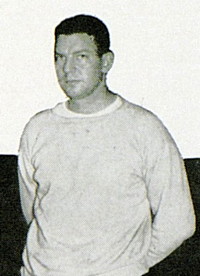 |
Rupp tabbed Harry Lancaster as the new assistant coach for the 1943-44 season although there was no freshman team to coach. Lancaster had attended Georgetown College in the late 20's and early 30's and faced Kentucky in what was UK Coach Adolph Rupp's first game with the school.
According to Lancaster's book (Adolph Rupp As I Knew Him, Lexington Productions, 1979), Lancaster had coached at the high school level before taking a position at UK with the Physical Education Department, Lancaster ended up becoming a scout for Rupp and when McBrayer left, Lancaster was hired to take his spot as assistant coach.
Near the end of the season, Lancaster himself received a draft notice. He was scheduled to report for duty at the Louisville Armory the same day (March 2, 1944) incidentally that Kentucky was set to begin playing the SEC tournament in the same city.
According to Lancaster's book:
| "That morning they were taking all the draftees into either the Navy or the Marines. I motioned [UK AD Bernie] Shively off on one side and said, 'Hell, Shive, I'm thirty years old. I can't go through the Semper Fidelis Marine Corps stuff. Do something to get me in the Navy.'
'Harry, how do you expect me to do that?' I asked, 'Do you have any tournament tickets with you?' He did. 'Well, then offer that Navy Lieutenant tickets to the whole damn thing if I get in the Navy.' It worked and at 7:30 that morning I was sworn into the Navy. Twelve hours later we played Georgia in the first round of the tournament in the same arena." (Adolph Rupp As I Knew Him, Lexington Productions, 1979) |
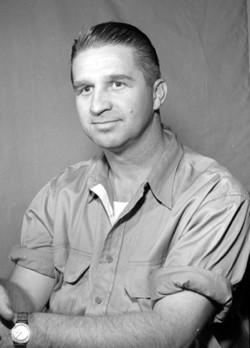 |
Prior to the 1946-47 season, Lancaster was getting out of the service and was interested in returning as assistant coach. He had received an offer from his alma mater, Georgetown College, to become head basketball and baseball coach, but was holding out hope of returning to UK. After receiving a letter from Rupp suggesting to hold off on the offer from Georgetown, Lancaster chose to return to his position at UK in the Physical Education Department and take his chances.
Paul McBrayer was also returning from the military and was interested in taking back his former position, however apparently this was not what Rupp was interested in.
According to Lancaster's book:
| "Rupp had told me after McBrayer went into the service that he did not want Mac back after the war. I got the idea that Adolph thought Mac was after his job. Some of Mac's friends pointed out that, according to the law, he was entitled to his old job back after serving in the military. McBrayer had only worked for the University about three months a year and had been paid only about five hundred dollars for his part-time position with the basketball program. The University had decided that if he wanted his job back he could get the same deal in some other capacity. Naturally, he lost interest."
(Adolph Rupp As I Knew Him, Lexington Productions, 1979) |
Lancaster continued to serve as assistant coach under Rupp until the summer of 1968, when he became the interim athletic director, which technically made him Rupp's boss.
The freshman team also continued during this time, although as the coaching staff increased in number during the 1960's, other assistants took a greater role with the freshman team. In particular, another former Rupp player Joe Hall became an assistant coach starting with the 1965-66 season. Hall was the primary recruiter for the program at the time and later succeeded Rupp as the head coach after Rupp was forced into retirement in 1972.
There were many heralded players on the UK Freshman team that for various reasons never made it to varsity. For example on the 1963-64 freshman team was Wayne Chapman of Owensboro. After his freshman year he transferred to Western Kentucky University and later played in the ABA. Chapman's son, Rex would later become a star for Kentucky in the mid-1980's.
Another freshman player, Alvin Ratliffe who was on the 1965-66 freshman team was drafted into the Army and served in Vietnam (earning a Bronze Star and Purple Heart) before returning to play Delta State University and later signing with the Atlanta Hawks.
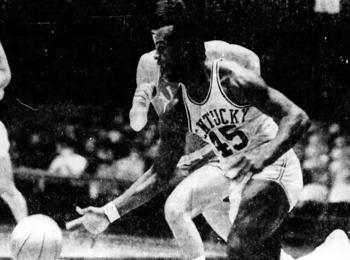 |
Bishop is technically the first black player to play basketball at UK, although it came on the freshman team. Bishop played on the varsity basketball team later in his career but that was after Tom Payne integrated the varsity team.
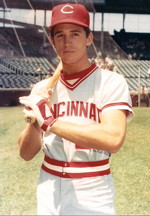 |
At 5'10", Flynn played guard for the freshman Blue and White, where he averaged a respectable 8.6 points per game. (this was the highest among the non-scholarship players excluding Bishop). Flynn never made it to the varsity team, however. He later signed with the Cincinnati Reds in 1971 and went on to enjoy a 10-year career in Major League Baseball.
Probably the most famous freshman team at UK was the 1971-72 "Super Kittens". This highly regarded group was recruited by Joe Hall and it was Hall who coached them to a perfect 22-0 freshman record. When they moved on to the varsity team for the 1972-73 season, Hall came with them as he assumed the head coaching position.
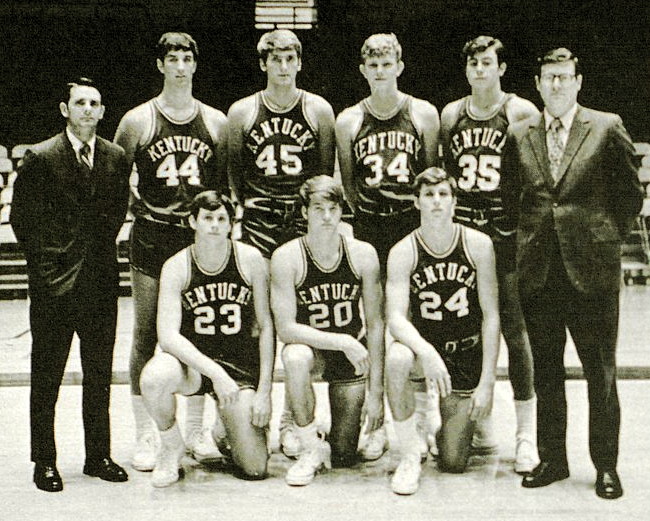 |
Kneeling (l to r): Jerry Hale, Jimmy Dan Conner, Mike Flynn Standing: Coach Dickie Parsons, Steve Lochmueller, Bob Guyette, G.J. Smith, Kevin Grevey, Coach Joe Hall |
Junior Varsity Squads
With the change in head coach, there was also a change in the freshman team as it was during this year (1972) that the NCAA announced the reinstatement of freshman eligibility.
Kentucky once again started to allow freshman players participate on the varsity, beginning with the 1972-73 season. It is suggested that this move by the NCAA was a cost-cutting measure, as many schools found it to be a financial burden to retain both a varsity and freshman team. Kentucky apparently saw the benefits of having such a two-team system and converted their freshman team to a Junior-Varsity team, which allowed younger players who didn't' see a lot of time at the varsity level to still stay sharp and in game shape.
This arrangement remained at Kentucky through the 1975-76 season and the junior-varsity program was shelved.
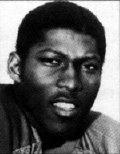 |
Ramsey was a football star at Kentucky, playing quarterback and tight end, and later enjoyed a long career in the National Football League as a Tight End. After his professional athletic career, he entered college athletics as as administrator. He currently serves as the athletic director at Coppin State University.
A Brief Renewal
After being dormant for decades, the Junior Varsity team was revived briefly during the 1995-96 season by then Kentucky coach Rick Pitino. The 1996 team was one of Kentucky's deepest and most talented teams, and it was thought that the freshmen players would not see a lot of court time during the regular season.
In particular, Kentucky had a young player out of Chicago by the name of Nazr Mohammed who was considered a project at the time, and more than anything needed to see game time to develop and to improve his conditioning. Mohammed joined other freshmen including Oliver Simmons to go along with walk-ons Jason Lathrem and Cameron Mills to form the nucleus of the team. These players could participate in varsity games as well as junior varsity games, as long as the total number of games did not go above the NCAA limit. Pitino tabbed his assistant coach, Delray Brooks, to coach the team.
Included on the team was a player by the name of Michael Yang, who may have made history by being the first UK basketball player of Asian descent. Another player on the team, Frank Vogel, also served as a student manager for the varsity and later went on to become a successful head coach in the NBA.
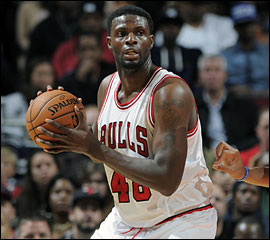 | 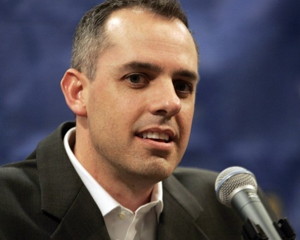 |
![]()
 |
| Continue to Teams |
![]()
Return to Kentucky basketball page.